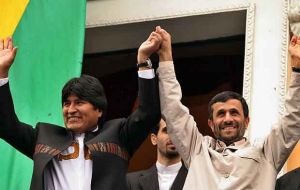MercoPress. South Atlantic News Agency
Bolivia ignores US warnings and reaches out to Iran
 Pte. Morales receive Pte. Ahmadinejad in La Paz
Pte. Morales receive Pte. Ahmadinejad in La Paz Iran's president Mahmoud Ahmadinejad and a delegation of 35 officials arrived Thursday morning in La Paz for a half day visit to Bolivia as part of Teheran's policy to break increasing international isolation, which is welcomed by left leaning regimes in the region anxious to counterweight United States influence.
With first-time diplomatic relations only established earlier this month, the Iranian president visits Bolivia on the heels of his UN General Assembly address in which he said Teheran will ignore demands by "arrogant powers" to curb its nuclear program. President Mahmoud Ahmadinejad brief visit agenda included political talks with President Evo Morales and signing several trade and cooperation agreements which according to Bolivian officials could help better tap the continent's second-largest natural gas reserves after Venezuela's, and drum up urgently needed agricultural investment. Bolivian Foreign Affairs minister David Choquehuanca said Iran has a long and effective experience in developing and industrializing non renewable natural resources such as oil and gas which Bolivia hopes to take advantage off. But Bolivia's close links with Teheran have been questioned by US ambassador Philip Goldberg and opposition parties. Ambassador Goldberg has met with President Morales reiterating Washington's official policy of condemning Iran's nuclear program, because allegedly it has an ultimate arms purpose, plus the fact that the Teheran regime sponsors anti US terrorist groups. Cabinet Chief Alfredo Rada downplayed the Bush administration's objections arguing that "we are no longer a US protectorate" and "we have our own foreign policy". Iran and Morales' "anti-imperialist" administration appear to be on the same political track. However opposition parties have warned President Morales that they would block any agreements with Teheran which included the development or exploitation of uranium deposits of which there are ample reserves in the south of Bolivia. Leading opposition Senator Arturo Murillo said "we have no guarantees that Bolivian uranium will be used for peaceful purposes, so we are not running any risks" and described diplomatic relations with Iran "an unnecessary provocation". Bolivian Vice President Alvaro Garcia said President Morales' administration doesn't endorse nuclear proliferation and the two nations simply want to build commercial ties. Bolivia is forging "diplomatic relations with Iran to improve the country's economic situation, not to hurt or offend anyone" insisted Garcia. Bolivia exported nothing to Iran between 2000 and 2006, and Iranian exports to Bolivia totaled just 10 million US dollars last year, according to government statistics, down from 24 million a year earlier. In the afternoon Ahmadinejad left for Caracas to meet Venezuelan leader Hugo Chavez. The Iranian president trip underscores Teheran's strengthening links to Latin American nations that also include Nicaragua and Ecuador even as Washington tries to isolate him internationally. Ties between Caracas and Tehran are strong and growing. Iran and Venezuela have signed more than 180 trade agreements since 2001, worth more than 20 billion US dollars in potential investment between the two, according to Iran's official news agency, IRNA. President Chavez refers to his Iranian counterpart, with whom he has met on five occasions as a "brother and ally" and on the eve of his arrival praised his courage and dignity during the "recent ambush" he suffered when invited to lecture at the Columbia University in New York. Chavez is a vocal defender of Iran's nuclear program, accusing the United States of trumping up unfounded concerns about possible nuclear weapons as a pretext to attack a regime it opposes. "Iran isn't making an atomic bomb, not at all," Chavez insisted this week. "They just want to develop nuclear energy. Venezuela will do it also someday." Ecuadorian President Rafael Correa also wants closer ties with Tehran, and Iran's PressTV reported last month that Iran will for the first time open an embassy in Quito. President Daniel Ortega of Nicaragua last month accepted promised Iranian aid of funding for 4,000 tractors, milk-processing plants, 10,000 houses, piers and the construction of a farm equipment assembly plant. In exchange, Nicaragua agreed to export coffee, meat and bananas to Iran.




Top Comments
Disclaimer & comment rulesCommenting for this story is now closed.
If you have a Facebook account, become a fan and comment on our Facebook Page!